Related Research Articles
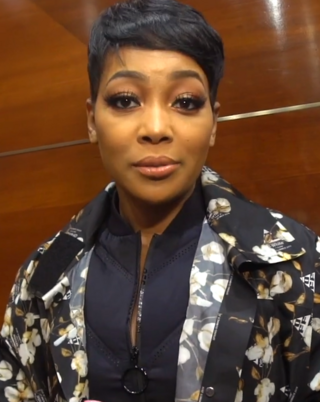
Monica Denise Arnold is an American singer, rapper, songwriter, and actress. Born and raised in College Park, Georgia, she began performing as a child and joined a traveling gospel choir by the age of ten. Monica signed with record producer Dallas Austin through his label Rowdy Records in 1993, and gained prominence following the release of her debut studio album, Miss Thang (1995). Her follow-up albums were met with continued success; her second, The Boy Is Mine (1998) remains her best-selling album and spawned three Billboard Hot 100-number one singles: "The Boy Is Mine", "The First Night" and "Angel of Mine".

Ronnie Lee Milsap is an American country music singer and pianist.
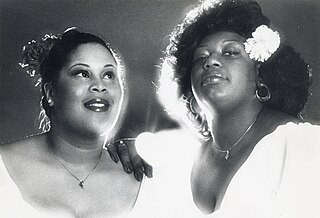
The Weather Girls are an American female duo whose best-known line-up comprised Martha Wash and Izora Armstead. Formed in 1976 in San Francisco, California, Wash and Armstead began their musical careers as Two Tons O' Fun, the female backup duo for disco singer Sylvester. After several years of singing background for Sylvester, the duo was signed in 1979 to Fantasy Records as Two Tons O' Fun. The duo changed their name to The Weather Girls and were launched into somewhat more mainstream recognition following the release of the single, "It's Raining Men" (1982), which became their first number-one song on the US Dance Chart and their biggest hit. Despite having several hit songs on the Dance Chart as Two Tons O' Fun and The Weather Girls, the duo never achieved a top 40 hit on the main US Hot 100 and ultimately disbanded in 1988 after the release of their self-titled fifth album The Weather Girls.

James Edward Ingram was an American singer, songwriter and record producer. He was a two-time Grammy Award-winner and a two-time Academy Award nominee for Best Original Song. After beginning his career in 1973, Ingram charted eight top 40 hits on the U.S. Billboard Hot 100 chart from the early 1980s until the early 1990s, as well as thirteen top 40 hits on the Hot R&B/Hip-Hop Songs chart. In addition, he charted 20 hits on the Adult Contemporary chart. He had two number-one singles on the Hot 100: the first, a duet with fellow R&B artist Patti Austin, 1982's "Baby, Come to Me" topped the U.S. pop chart in 1983; "I Don't Have the Heart", which became his second number-one in 1990 was his only number-one as a solo artist.
Paul Louis Hardcastle is an English composer, musician, producer, songwriter, radio presenter and multi-instrumentalist. He is best known for his song "19", which went to number one in the UK Singles Chart in 1985.

Angela Laverne Brown, known professionally as Angie Stone, is an American singer, songwriter, actress, and record producer. She rose to fame in the late 1970s as member of the hip hop trio the Sequence. In the early 1990s, she became a member of the R&B trio Vertical Hold. Stone then signed with Arista Records to release her debut solo album Black Diamond (1999), which received gold certification by the Recording Industry Association of America (RIAA) and spawned the single "No More Rain ".

"It's Raining Men" is a song by the American musical duo The Weather Girls from their third studio album, Success (1983). It was released as the album's lead single on September 10, 1982, through Columbia Records and CBS Records International. Paul Jabara wrote the song in collaboration with Paul Shaffer, and produced the song in collaboration with Bob Esty. "It's Raining Men" incorporates elements of R&B, soul, and 1970s-style electronic dance music. Its lyrics describe an excitement and enjoyment of many different types of men.

"Let the Music Play" is a song recorded by American singer Shannon and released on September 19, 1983, as both her debut single and the lead single from her 1984 debut studio album of the same name. Written by Chris Barbosa and Ed Chisolm, and produced by Barbosa and Mark Liggett, "Let the Music Play" was the first of Shannon's four number ones on the US Dance Club Songs chart, reaching the top spot in October 1983. It also became a huge crossover hit in the US, peaking at number two on the Hot R&B/Hip-Hop Songs chart and number eight on the Billboard Hot 100 in February 1984. It was Shannon's only top 40 hit in the US. Some mark "Let the Music Play" as the beginning of the "dance-pop" era. "Let the Music Play" was ranked 43rd on the 2009 VH1 Special 100 Greatest One-Hit Wonders of the 1980s, while Rolling Stone and Billboard featured it in their lists of "200 Greatest Dance Songs of All Time" and "500 Best Pop Songs of All Time" in 2022 and 2023, respectively. The song also appears in the film Totally Killer and the video games Dance Central 3 and Scarface: The World Is Yours.
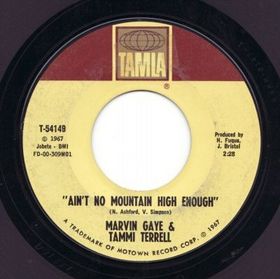
"Ain't No Mountain High Enough" is a song written by Nickolas Ashford & Valerie Simpson in 1966 for the Tamla label, a division of Motown. The composition was first successful as a 1967 hit single recorded by Marvin Gaye and Tammi Terrell, and became a hit again in 1970 when recorded by former Supremes frontwoman Diana Ross. The song became Ross's first solo number-one hit on the Billboard Hot 100 chart and was nominated for the Grammy Award for Best Female Pop Vocal Performance.

"Ain't Nothing Like the Real Thing" is a 1968 single released by American R&B/soul duo Marvin Gaye and Tammi Terrell, on the Tamla label in 1968. The B-side of the single is "Little Ole Boy, Little Ole Girl" from the duo's United LP. The first release off the duo's second album: You're All I Need, the song—written and produced by regular Gaye/Terrell collaborators Ashford & Simpson—became a hit within weeks of release eventually peaking at number eight on the US Billboard Hot 100 and number one on the Hot Soul Singles chart, the first of the duo's two number-one R&B hits. In the UK "Ain't Nothing Like the Real Thing" reached number 34.
"Teach Me Tonight" is a popular song that has become a jazz standard. The music was written by Gene De Paul, the lyrics by Sammy Cahn. The song was published in 1953.
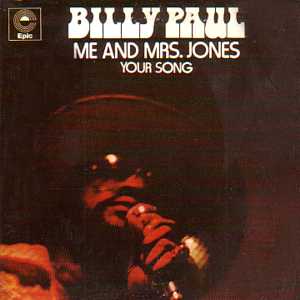
"Me and Mrs. Jones" is a 1972 soul song written by Kenny Gamble, Leon Huff, and Cary Gilbert, and originally recorded by Billy Paul. It describes an extramarital affair between a man and his lover, Mrs. Jones. In the song, the two meet in secret "every day at the same cafe", at 6:30, where they hold hands and talk. The two are caught in a quandary: "We got a thing going on/we both know that it's wrong/but it's much too strong/to let it go now."

"Lean on Me" is a song written and recorded by American singer-songwriter Bill Withers. It was released in April 1972 as the first single from his second album, Still Bill. It was a number one single on both the soul and Billboard Hot 100 charts, the latter chart for three weeks in July 1972. Billboard ranked it as the No. 7 song of 1972. It was ranked number 208 on Rolling Stone's list of "The 500 Greatest Songs of All Time" in 2010. Numerous other versions have been recorded, and it is one of only nine songs to have reached No. 1 on the Billboard Hot 100 with versions recorded by two different artists. In 2007, the 1972 recording of the song by Bill Withers on Sussex Records was inducted into the Grammy Hall of Fame. 1970s Glam Rock band 'MUD' recorded a cover of the song in 1976 that became a chart hit in the UK the same year.

"I'll Be There for You/You're All I Need to Get By" is a duet song by American rapper Method Man, featuring American singer-songwriter Mary J. Blige. The song is a remix of Method Man's "All I Need", which appears on his debut studio album Tical (1994). The song, a hip hop soul record, was released as a single by Def Jam Recordings and PolyGram Records on April 25, 1995.
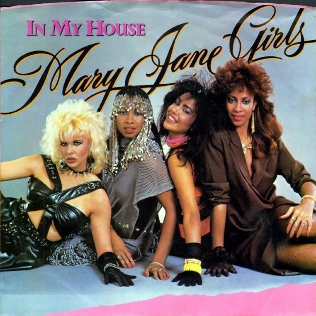
"In My House" is a song produced, written and arranged by American musician Rick James and recorded by his protégées, the Mary Jane Girls, for their second studio album, Only Four You (1985). It was released as the album's lead single in October 1984 by Gordy Records. In the United States, the single topped Billboard's Dance Club Songs chart in April 1985 and remained atop the chart for two weeks. It also reached the top 10 on both the Billboard Hot 100 and Billboard Hot R&B/Hip-Hop Songs chart, peaking at number seven on the Hot 100 in June 1985 and remained in the top 40 for 12 weeks. It is the group's highest-peaking single and their only top-40 entry on the Billboard Hot 100, although they have had other singles succeed on both the R&B and dance charts.
Margaret Marie Joseph is an American R&B, soul and gospel singer. Her greatest success came in the 1970s with a duet with Blue Magic on "What's Come Over Me" and her versions of Paul McCartney's "My Love" and The Supremes' "Stop! In the Name of Love".
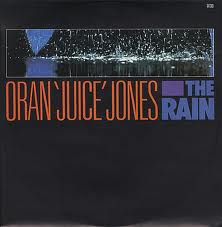
"The Rain" is a 1986 crossover hit single originally performed by R&B singer Oran "Juice" Jones, which he released on and from his debut album Juice.
"Funny How Time Slips Away" is a song written by Willie Nelson and first recorded by country singer Billy Walker. Walker's version was issued as a single by Columbia Records in June 1961 and peaked at number 23 on the Hot C&W Sides chart. The song has been featured in several live action films and television shows, such as in the first episode of the second season of AMC’s Better Call Saul and in the 2020 Netflix drama The Devil All the Time.

Anthology is a compilation album by country pop singer Juice Newton. It was originally released by Renaissance Records on October 13, 1998. The album covers her career from 1975 to 1989 and features 19 songs taken from her albums Juice Newton & Silver Spur, Juice, Quiet Lies, Can't Wait All Night, Old Flame, Emotion, and Ain't Gonna Cry. However, it includes the 1975 take of "The Sweetest Thing " from the first RCA album, not the 1981 hit version from Juice.
References
- 1 2 Texas, U.S., Birth Index, 1903-1997.
- 1 2 3 Whitburn, Joel (2006). "The Billboard Book of Top 40 R&B and Hip-Hop Hits". Billboard (illustrated ed.). University of Michigan. p. 300. ISBN 9780823082834.
- 1 2 3 Wynn, Ron. "Artist Biography". AllMusic . Retrieved January 3, 2022.
- ↑ Williamson, T. Carter (February 22, 2020). "Oran 'Juice' Jones: Still 'In The Rain' & Healthy 35 Years Later". blackdoctor.org. Retrieved January 3, 2022.
- ↑ "Oran Juice Jones Page". Soulwalking.co.uk. Retrieved September 24, 2020.
- ↑ Whitburn, Joel (2004). Top R&B/Hip-Hop Singles: 1942-2004. Record Research. p. 307.
- ↑ Greenblatt, Leah (April 7, 2009). "VH1's 100 Greatest One Hit Wonders of the '80s: Do You Agree?". Entertainment Weekly .
- ↑ "Oran Juice Jones". Grammy.com. Retrieved May 8, 2021.
- ↑ Lewis, Miles Marshall (July 22, 2016). "[INTERVIEW] Jody Watley: Pop's Fashionista Godmother". Ebony . Retrieved January 12, 2020.
- ↑ Lindemulder, Janine. "Weekendowa Bezsensja: Muzyka 18+, czyli muzyka a branża porno (3)". Esensja.pl (in Polish). Retrieved January 15, 2020.
- 1 2 "Oran "Juice" Jones - Awards". AllMusic. Archived from the original on April 8, 2013. Retrieved January 3, 2022.
- 1 2 3 "Oran Juice Jones Top Songs / Chart Singles Discography". Music VF. Retrieved September 24, 2020.
- ↑ Kent, David (1993). Australian Chart Book 1970–1992 (illustrated ed.). St Ives, N.S.W.: Australian Chart Book. p. 161. ISBN 0-646-11917-6.
- ↑ "ORAN 'JUICE' JONES - full Official Chart History". Official Charts Company . Retrieved September 24, 2020.
- ↑ "Oran 'Juice' Jones - The Rain". bpi.co.uk. Retrieved January 15, 2022.